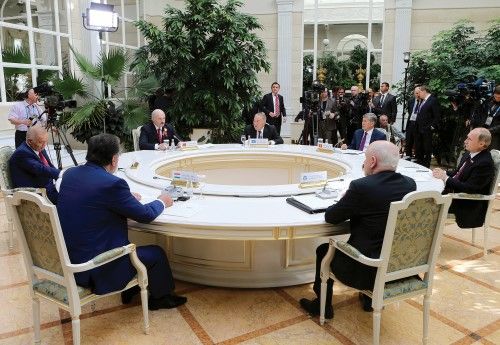
At the informal meeting of CIS heads of state
Logic of consecutive meetings says all: the CIS summit honours memory of ties which helped achieve Victory.
“But, when all’s said and done, we are bad heirs for those veterans of the war who are still alive and for those thirty million who haven’t returned from the war. We haven’t preserved the country they protected,” noted the President.
Alas, this is a historical fact: dramatic and, unfortunately, even tragic. The USSR has disappeared almost twenty five years ago and it’s not calm on the territory which was once occupied by the big country. Mr. Lukashenko was speaking about Ukraine whose representative was absent at the CIS summit. De-facto the brotherly nation ceased its participation in this inter-state union but didn’t leave it from the legal point of view. The President reminded about the experience of Georgia, referring to the thought that emotions on a global scale are a bad adviser. It’s easy to leave the club of close friends while the way back is much more complex. It’s common knowledge that all our countries are closely connected via history, mentality, economy.
“ We often say that victory is common and indivisible… We don’t really have anything to divide… It was not Russians nor Belarusians, Kazakhs nor Kyrgyz people, Uzbeks nor Tajiks, who won alone. The great Soviet nation gave us the Great Victory. It’s very acute now and should work for the uniting of our states and nations.”
The whole world is now experiencing difficult times, with some hanging their heads. However, it’s necessary to look into the future with optimism and this is the content of the second summit in Moscow which brought together the heads of state of the Eurasian Economic Union. This was the first official meeting of the presidents of the ‘integration five’ since the beginning of the year when the Eurasian Economic Union became officially operational. The agenda included two dozen concrete projects: from the formation of common energy market to the simplification of conditions for the work of haulers. However, some points come under special notice. Free trade between the Eurasian Economic Union and Vietnam was also discussed, as was the beginning of negotiations with China regarding the agreement on trade-economic co-operation with the union. Kyrgyzstan has joined the Eurasian Economic Union, after a similar step by Armenia. This primarily testifies to the fact that centripetal tendencies now replace centrifugal trends within the post-Soviet space. Moreover, they are interesting to many countries. If such powers as the PRC and Vietnam aspire towards rapprochement with the Eurasian Economic Union, a firm conclusion can be made regarding the correctness of the chosen course for the Eurasian integration. If countries stick together, crises are no longer dangerous.
Meanwhile, all heads of state at the CIS summit and at the Supreme Eurasian Economic Council session spoke about inadmissibility of history revision. Any speculations about depreciating the role of our nations in fascism destruction are inappropriate. This is our Victory. Common. One for All.
By Veniamin Mikheev











